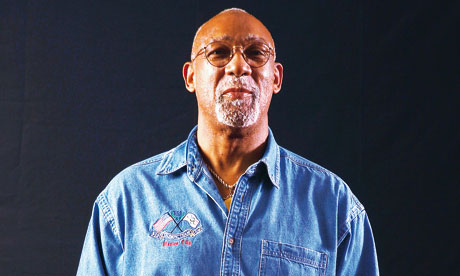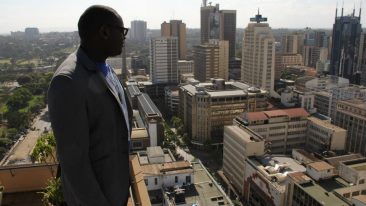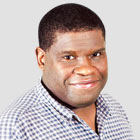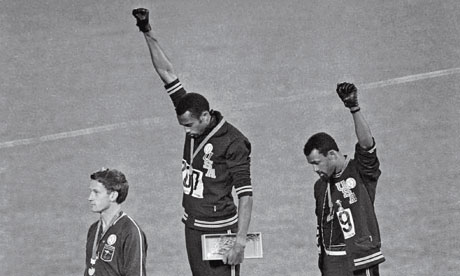You're probably not familiar with the name John Carlos. But you almost certainly know
his image. It's 1968 at the Mexico City Olympics and the medals are being hung round the necks of
Tommie Smith (USA, gold),
Peter Norman (Australia, silver) and Carlos (USA, bronze). As the Star-Spangled Banner begins to play, Smith and Carlos, two black Americans wearing black gloves, raise their fists in the black power salute. It is a symbol of resistance and defiance, seared into 20th-century history, that Carlos feels he was put on Earth to perform.
"In life, there's the beginning and the end," he says. "The beginning don't matter. The end don't matter. All that matters is what you do in between – whether you're prepared to do what it takes to make change. There has to be physical and material sacrifice. When all the dust settles and we're getting ready to play down for the ninth inning, the greatest reward is to know that you did your job when you were here on the planet."
Carlos's beginning was, to say the least, eventful. Raised by two involved, working parents, he learned to hustle with his friends in Harlem and fight his way out of and into trouble. As a teenager, he used to chase
Malcolm X down the street after his speeches and fire questions at him. Carlos always knew he was good at sports and originally wanted to be an Olympic swimmer, until his father broke it to him that the training facilities he needed were in private clubs for whites and the wealthy. He used to steal food from freight trains with his friends and then run with it into Harlem and hand it out to the poor. When the police gave chase, he was often the only one who never got caught. Running came so naturally, he never thought of it as a skill.
That single moment on the podium cost Carlos dear. More than four decades later, you'll find him at his desk in a spacious portable building behind the basketball courts at
Palm Springs High School in California, where he works as a counsellor. Among the family photographs on the wall are the vaguest allusions to his moment in history. Pictures of Malcolm X and African-American writer
Zora Neale Hurston, the pledge of allegiance, which American schoolkids must say to the flag every day, and a small poster saying Go For Gold Olympics.
For all its challenges, Carlos loves his job. "Being a counsellor, you have to talk to the children as though you're talking to a thousand people," he says. "Sometimes you say, 'I love you' and they say, 'I don't want your love' and you say, 'Well, it's out there, so you're going to have to deal with it.' And I learn a lot from them, too."
 John Carlos: 'It's what I was born to do,' he says of his salute. Photograph: Michael Steele/Getty Images
John Carlos: 'It's what I was born to do,' he says of his salute. Photograph: Michael Steele/Getty Images
Bald, tall, with a grey goatee, Carlos has glided into old age with a distinguished air and convivial manner, and more than a passing resemblance to the late activist and intellectual
WEB DuBois.
"The first thing I thought was the shackles have been broken," Carlos says, casting his mind back to how he felt in that moment. "And they won't ever be able to put shackles on John Carlos again. Because what had been done couldn't be taken back. Materially, some of us in the incarceration system are still literally in shackles. The greatest problem is we are afraid to offend our oppressors.
"I had a moral obligation to step up. Morality was a far greater force than the rules and regulations they had. God told the angels that day, 'Take a step back – I'm gonna have to do this myself.'"
The image certainly captures that sense of momentary rebellion. But what it cannot do is evoke the human sense of emotional turmoil and individual resolve that made it possible, or the collective, global gasp in response to its audacity. In his book,
The John Carlos Story, in the seconds between mounting the podium and the anthem playing, Carlos writes that his mind raced from the personal to the political and back again. Among other things, he reflected on his father's pained explanation for why he couldn't become an Olympic swimmer, the segregation and consequent impoverishment of Harlem, the exhortations of
Martin Luther King and Malcolm X to "be true to yourself even when it hurts", and his family. The final thought before the band started playing was, "Damn, when this thing is done, it can't be taken back.
"I know that sounds like a lot of thoughts for just a few moments standing on a podium," he writes. "But honestly this was all zigzagging through my brain like lightning bolts."
Anticipating some kind of protest was afoot, the International Olympic Committee (IOC) had sent
Jesse Owens to talk them out of it. (
Owens's four gold medals at the 1936 Olympics in Berlin themselves held great symbolic significance, given Hitler's belief in Aryan supremacy.) Carlos's mind was made up. When he and Smith struck their pose, Carlos feared the worst. Look at the picture and you'll see that while Smith's arm is raised long and erect, Carlos has his slightly bent at the elbow. "I wanted to make sure, in case someone rushed us, I could throw down a hammer punch," he writes. "We had just received so many threats leading up to that point, I refused to be defenceless at that moment of truth."
It was also a moment of silence. "You could have heard a frog piss on cotton. There's something awful about hearing 50,000 people go silent, like being in the eye of a hurricane."
And then came the storm. First boos. Then insults and worse. People throwing things and screaming racist abuse. "Niggers need to go back to Africa!" and, "I can't believe this is how you niggers treat us after we let you run in our games."
"The fire was all around me," Carlos recalls. The IOC president ordered Smith and Carlos to be suspended from the US team and the Olympic village. Time magazine showed the Olympic logo with the words Angrier, Nastier, Uglier, instead of Faster, Higher, Stronger. The LA Times accused them of engaging in a "Nazi-like salute".
Beyond the establishment, the resonance of the image could not be overstated. It was
1968; the black power movement had provided a post-civil rights rallying cry and the anti-Vietnam protests were gaining pace. That year, students throughout Europe, east and west, had been in revolt against war, tyranny and capitalism.
Martin Luther King had been assassinated and the US had been plunged into yet another year of race riots in its urban centres. Just a few months earlier, the Democratic party convention had been disrupted by a huge police riot against Vietnam protesters. A few weeks before the Games, scores of students and activists had been gunned down by authorities in Mexico City itself.
The sight of two black athletes in open rebellion on the international stage sent a message to both America and the world. At home, this brazen disdain for the tropes of American patriotism – flag and anthem – shifted dissidence from the periphery of American life to primetime television in a single gesture, while revealing what DuBois once termed the "essential two-ness" of the black American condition. "An American, a Negro; two souls, two thoughts, two unreconciled strivings; two warring ideals in one dark body, whose dogged strength alone keeps it from being torn asunder."
Globally, it was understood as an act of solidarity with all those fighting for greater equality, justice and human rights.
Margaret Lambert, a Jewish high jumper who was forced, for show, to try out for the 1936 German Olympic team, even though she knew she would never be allowed to compete, said how delighted it made her feel. "When I saw those two guys with their fists up on the victory stand, it made my heart jump. It was beautiful."
As Carlos explains in his book, their gesture was supposed, among other things, to say: "Hey, world, the
United States is not like you might think it is for blacks and other people of colour. Just because we have USA on our chest does not mean everything is peachy keen and we are living large."
Carlos understood, before he raised his fist that day, that once done, his act could not be taken back. What he could not have anticipated, at the age of 23, was what it would mean for his future. "I had no idea the moment on the medal stand would be frozen for all time. I had no idea what we'd face. I didn't know or appreciate, at that precise moment, that the entire trajectory of our young lives had just irrevocably changed."
During
the Jim Crow era, life for even the most famous black sportsmen past their prime was tough. After his celebrated Olympic victory, Owens ran a dry-cleaning business, was a gas pump attendant, raced horses for money and eventually went bankrupt. "People say it was degrading for an Olympic champion to run against a horse," he said. "But what was I supposed to do? I had four gold medals, but you can't eat four gold medals."
Joe Louis, a world champion boxer on whose shoulders rested national pride when he fought German
Max Schmeling shortly before the second world war, greeted visitors at Caesars Palace in Las Vegas and went on quiz shows. And these were sporting figures who tried to keep in with the establishment. Carlos was still in his prime, but that single act of defiance ensured his marginalisation.
Paradoxically, the next year was the best of his career. In 1969, he equalled the 100 yard world record, won the American
Athletics Union 220-yard dash and led San Jose State to its first National Collegiate Athletic Association championship.
The trouble was, in the years before lucrative sponsorship deals, running didn't pay and few would employ him. In the years immediately following his protest, he worked security at a nightclub and as a janitor. At one point he had to chop up his furniture so he could heat his house. The pressure started to bear down on his family. "When there's a lack of money, it brings contempt into the family," he says. Moreover, his wife was facing constant harassment from the press and his children were being told at school that their father was a traitor. The marriage collapsed.
He tried American football for a few seasons, starting in Philadelphia, then moving north to Toronto and Montreal. He is keen to emphasise that the one thing that never happened, despite claims to the contrary, is that he had his medal confiscated. It's at his mother's house. And while he does not cherish it as you'd expect an Olympian might, he's adamant that this part of the story is set straight. "The medal didn't mean shit to me. It doesn't mean anything now… The medal had no relevance. The one way it had relevance was that I earned it. So they never took my medal away from me. I'd earned it. They can't take it."
As time passed and the backlash subsided, Carlos was gradually invited back into the fold. He became involved as an outreach co-ordinator in the organising committee for the group bringing the Olympics to Los Angeles in 1984 and worked for the US Olympic Committee.
Did he worry, as the picture for which he was famous started to adorn T-shirts and posters, that his readmission into the Olympic world meant his radicalism was being co-opted and sanitised? "The image is still there," he says proudly. "It keeps getting wider. If you look at the images of the last century, there's nothing much like it out there. And 'the man' wasn't the one that kept this thing afloat for 43 years. The man was the same man whupping my arse. And the Olympics are part of my history. I'm not going to run away from that."
Carlos remains politically engaged. Late last year he addressed Occupy Wall Street protesters in New York. "It's the same fight as it was 43 years ago. We fought unemployment; for housing, education. It's the same thing as people are fighting for today."
He defends
Barack Obama, who he believes has not been given a fair shake. "Mr Obama didn't get us where we are. He's trying to get us out. Someone fabricates shit to get us into wars, then makes ordinary Americans pay for them. Now someone else is trying to make it right. If George W Bush can have two terms to put this country into this mess, we should give Obama two to get us out of it."
But, unlike during the 1960s, today Carlos sees little hope of resistance emerging through sport, which is awash with too much money and drugs. "There wasn't a whole bunch of money out there back then," he says, "so just a few people were ever going to be shakers and bakers. But today, if an athlete doesn't have a view of their history before them, then they have a view of just that big cheque in front of them. It's not the responsibility of the oppressor to educate us. We have to educate ourselves and our own. That's the difference between
Muhammad Aliand
Michael Jordan. Muhammad Ali will never die. He used his skill to say something about the social ills of society. Of course, he was an excellent boxer, but he got up and spoke on the issues. And because he spoke on the issues, he will never die. There will be someone else at some time who can do what Jordan could do. And then his name will just be pushed down in the mud. But they'll still be talking about Ali."
Eight years earlier, during a different phase of anti-racist activism in the US, a 17-year-old student,
Franklin McCain, had gained his place in the history books when he sat at a Woolworth's lunch counter in Greensboro, North Carolina, with three friends and refused to move until they were served. Many years later, McCain was philosophical about how that experience had affected him. "On the day that I sat at that counter, I had the most tremendous feeling of elation and celebration," he told me. "Nothing has ever come close. Not the birth of my first son, nor my marriage. And it was a cruel hoax, because people go through their whole lives and they don't get that to happen to them. And here it was being visited upon me as a 17-year-old. It was wonderful, and it was sad also, because I know that I will never have that again. I'm just sorry it was when I was 17."
Carlos has no such regrets. He's just glad he could be where he was to do what he felt he had to do. "I don't have any misgivings about it being frozen in time. It's a beacon for a lot of people around the world. So many people find inspiration in that portrait. That's what I was born for."
from the bbc:
1968: Black athletes make silent protest
Two black American athletes have made history at the Mexico Olympics by staging a silent protest against racial discrimination.Tommie Smith and John Carlos, gold and bronze medallists in the 200m, stood with their heads bowed and a black-gloved hand raised as the American National Anthem played during the victory ceremony.
The pair both wore black socks and no shoes and Smith wore a black scarf around his neck. They were demonstrating against continuing racial discrimination of black people in the United States.
As they left the podium at the end of the ceremony they were booed by many in the crowd.
'Black America will understand'
At a press conference after the event Tommie Smith, who holds seven world records, said: "If I win I am an American, not a black American. But if I did something bad then they would say 'a Negro'. We are black and we are proud of being black.
"Black America will understand what we did tonight."
Smith said he had raised his right fist to represent black power in America, while Carlos raised his left fist to represent black unity. Together they formed an arch of unity and power.
He said the black scarf represented black pride and the black socks with no shoes stood for black poverty in racist America.
Within a couple of hours the actions of the two Americans were being condemned by the International Olympic Committee.
A spokesperson for the organisation said it was "a deliberate and violent breach of the fundamental principles of the Olympic spirit."
It is widely expected the two will be expelled from the Olympic village and sent back to the US.
In September last year Tommie Smith, a student at San Jose State university in California, told reporters that black members of the American Olympic team were considering a total boycott of the 1968 games.
'Dirty negro'
He said: "It is very discouraging to be in a team with white athletes. On the track you are Tommie Smith, the fastest man in the world, but once you are in the dressing rooms you are nothing more than a dirty Negro."
The boycott had been the idea of professor of sociology at San Jose State university, and friend of Tommie Smith, Harry Edwards.
Professor Edwards set up the Olympic Project for Human Rights (OPHR) and appealed to all black American athletes to boycott the games to demonstrate to the world that the civil rights movement in the US had not gone far enough.
He told black Americans they should refuse "to be utilised as 'performing animals' in the games."
Although the boycott never materialised the OPHR gained much support from black athletes around the world.

In Context
|
That evening, the silver medallist in the 200m event, Peter Norman of Australia, who was white, wore an OPHR badge in support of Smith and Carlos' protest.But two days later the two athletes were suspended from their national team, expelled from the Olympic village and sent home to America.
Many felt they had violated the Olympic spirit by drawing politics into the games.
On their return both men were welcomed as heroes by the African-American community but others regarded them as trouble-makers. Both received death threats.
Thirty years after their protest, the two men, who went on to become high school athletics coaches, were honoured for their part in furthering the civil rights movement in America.
|
|
|









